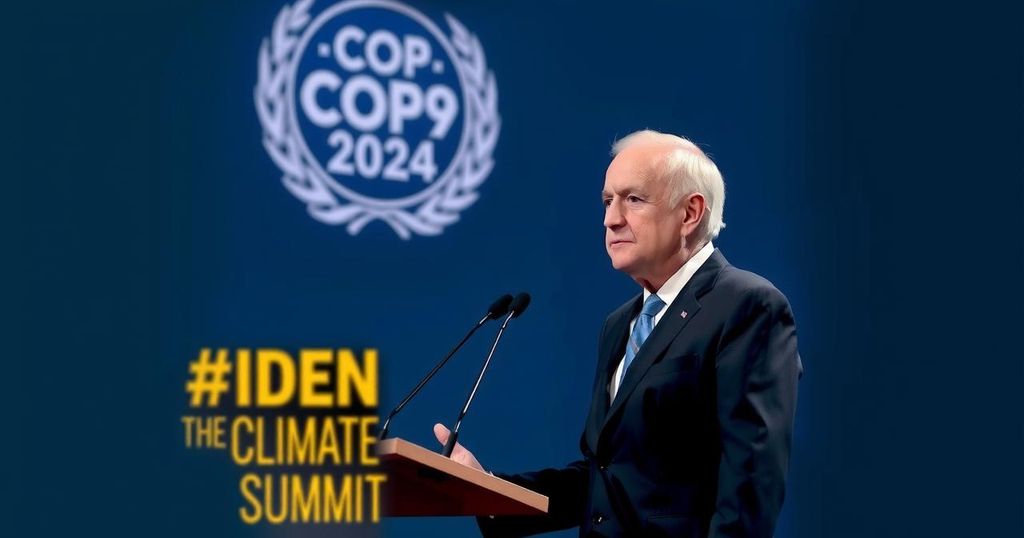President Biden to Miss COP29 Climate Summit Following US Elections

President Joe Biden will not attend the COP29 climate summit scheduled to open soon after the US election. His absence will be filled by senior advisors, including John Podesta. This summit aims to address crucial climate financing for vulnerable countries. Biden’s previous participation highlighted US commitments to climate leadership, which may be overshadowed by the electoral context and Trump’s intentions to withdraw from existing agreements.
President Joe Biden will forgo attending the upcoming COP29 climate summit, which is set to commence shortly after the US elections. This decision, confirmed by a source who requested anonymity, indicates that the delegation will be led by John Podesta, the senior presidential adviser for international climate policy. Notable figures from the federal government, including Agriculture Secretary Tom Vilsack, Energy Secretary Jennifer Granholm, and National Climate Adviser Ali Zaidi, will participate in the summit in Baku, Azerbaijan. While US presidents typically do not regularly attend these annual UN summits, Biden had previously leveraged his attendance at the 2021 and 2022 conferences to highlight the nation’s renewed commitment to combat climate change, following a period of diminished US leadership during Donald Trump’s presidency. The shadow of the electoral process in the United States may influence the discussions in Baku, particularly as nearly 200 countries convene to deliberate on the essential topic of public financing aimed at supporting vulnerable nations in their fight against climate change. This subject holds significant weight, considering the trillions of dollars required for developing countries to accomplish their climate objectives. The stakes are further heightened by Trump’s campaign promises to withdraw from the Paris Agreement if elected again. This marks the second occasion that President Biden will not attend the annual climate negotiations; Vice President Kamala Harris represented him at last year’s summit in Dubai. The Baku event overlaps with another pivotal meeting, the Group of 20 nations leaders summit, scheduled for November 18 and 19 in Rio de Janeiro, Brazil. Currently, there exists a climate finance commitment of $100 billion annually through 2025, but discussions are underway to establish additional pledges that could extend into the next decade, with hopes from officials in the US and other developed nations to engage China in future contributions.
The COP (Conference of the Parties) climate summits are critical platforms for international negotiations regarding the global response to climate change, where countries assess progress and make binding commitments. The COP29 summit is especially significant, as it follows the US elections, potentially impacting the direction of US climate policy. Under President Biden, the US has made notable strides to reclaim its role as a leader in climate discussions, a stark contrast to the previous administration’s approach. The discussions at COP29 will center around climate finance, an essential element in supporting developing nations faced with the challenges of climate change adaptation and mitigation. The need for increased financial support is pressing, as experts estimate that substantial investments are necessary to help these countries meet their environmental goals.
In summary, President Biden’s decision to skip COP29 underscores the tension between domestic electoral politics and international climate commitments. The high-level delegation scheduled to represent the US at the summit will aim to navigate crucial topics such as climate finance, amidst mounting pressure to engage more countries, including China, in the commitment to combat climate change. The absence of the President could impact the perception of US leadership on the global stage during this pivotal time.
Original Source: www.energyconnects.com






